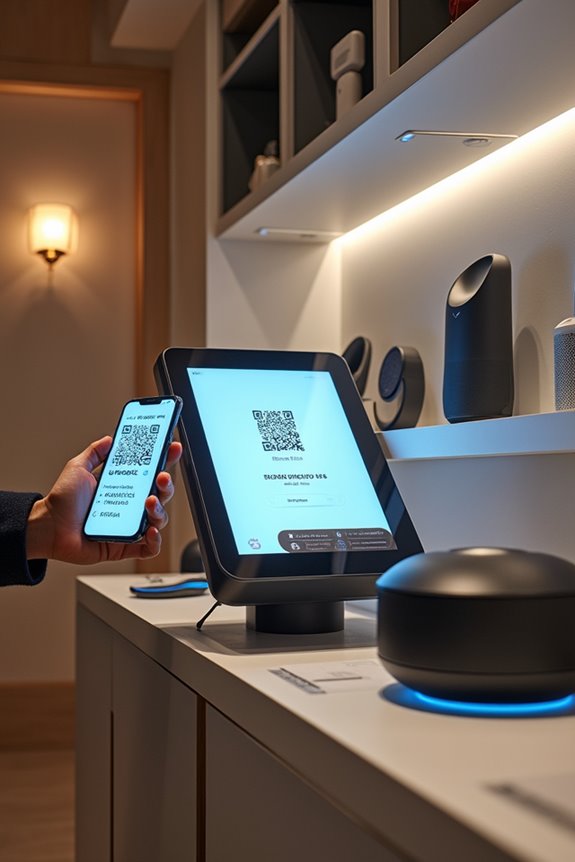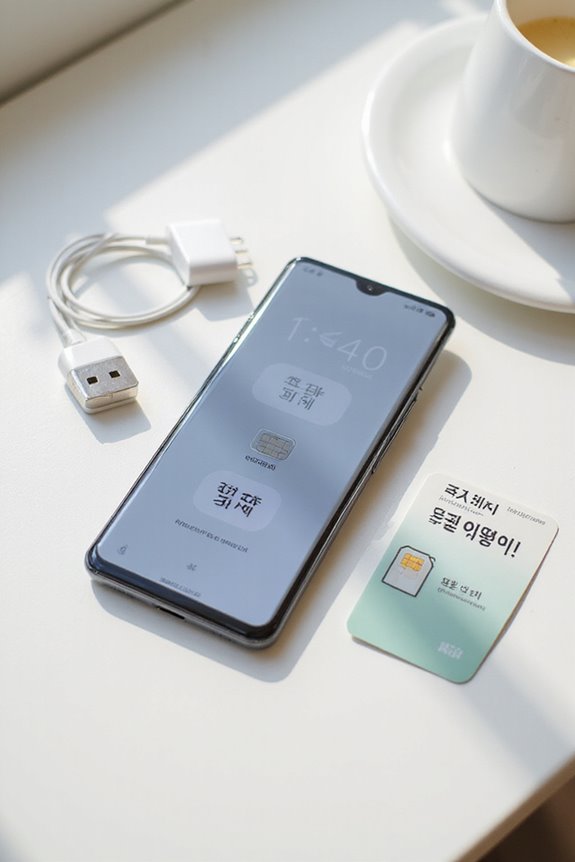In the Korean tech market, we see significant trends emerging, including rapid AI adoption and digital transformation, which companies like Samsung and Hyundai are leveraging. Additionally, the cloud security sector is experiencing growth, driven by the need for integrated solutions in industries such as finance and healthcare. E-commerce is shifting towards real-time payment systems, enhancing consumer experiences. Furthermore, 5G technology is enabling advancements in IoT and smart manufacturing. There’s also substantial government support fostering innovation and startup growth, indicating exciting developments ahead.
Key Takeaways
- The AI market in South Korea is projected to grow significantly, from USD 3.12 billion in 2024 to USD 30 billion by 2033.
- E-commerce is shifting toward real-time payments, with mobile commerce making up 75% of total sales, enhancing consumer convenience.
- The growth of cloud security solutions is driven by advancements in AI and digital transformation, especially in finance and healthcare sectors.
- The adoption of 5G technology is facilitating rapid IoT expansion, critical for connected devices and autonomous vehicles.
- Government initiatives aim to nurture over 1,000 deep-tech startups by 2027, bolstering the technology-driven economic landscape.
AI Adoption and Digital Transformation
As we explore the domain of AI adoption and digital transformation in South Korea, it’s clear that this market is experiencing significant growth and evolution. With the artificial intelligence market projected to expand from USD 3.12 billion in 2024 to USD 30 billion by 2033, substantial AI investment is evident across various sectors. Major players like Samsung and Hyundai are leveraging generative applications to access new capabilities, yet they face workforce challenges in finding skilled talent. Additionally, the implementation of the AI Framework Act promotes regulatory compliance, ensuring responsible AI deployment. As we navigate these advancements and regulations, the synergy between industry innovation and government support is essential to foster a thriving AI ecosystem in South Korea.
Cloud Security and Data Center Growth

The ongoing advancements in AI and digital transformation have directly impacted cloud security and data center growth in South Korea. Key industries, including finance and healthcare, are increasingly adopting integrated cloud security solutions to tackle complex cyber threats while ensuring cloud compliance. The rise of AI and machine learning enhances remote security protocols, improving threat detection and response times. Furthermore, the Cloud Identity and Access Management sector is expanding significantly, driven by the need for secure remote work environments and stringent regulations. As a result, the South Korean cloud data security market generated USD 178.5 million in 2024 and is projected to reach USD 528.1 million by 2030, reflecting a strong demand for cloud solutions amidst evolving threats.
E-commerce and Real-Time Payments

With e-commerce rapidly evolving in South Korea, we see a significant shift towards real-time payments as consumers demand more convenient and efficient transaction methods. Mobile commerce dominates this landscape, constituting 75% of all e-commerce sales. Major players, such as Coupang and Naver, are continuously innovating their payment systems to enhance user experience. As a result, real-time payment options have increased, offering consumers seamless transactions at their fingertips. Payment innovations, including digital wallets and contactless solutions, are vital to meet the needs of tech-savvy shoppers who prioritize security and convenience. With the e-commerce market projected to reach $230 billion in 2024, these trends will likely strengthen, making real-time payments a significant component of the ongoing digital transformation.
Emerging Technologies: 5G and Beyond

Emerging technologies fueled by 5G are poised to transform various sectors in South Korea, driving significant advancements in connected devices and services. The widespread adoption of 5G applications enables a rapid IoT expansion, allowing millions of devices to communicate seamlessly in real time. This connectivity supports developments in autonomous vehicles, which require high-speed data exchanges for navigation and safety. Additionally, smart manufacturing solutions benefit from 5G’s low latency, leading to increased automation and enhanced efficiency in production processes. Companies can optimize supply chains and monitor equipment remotely, maximizing productivity. As we harness the potential of 5G, South Korea positions itself at the forefront of technological innovation, creating new opportunities across various industries. The rise of wireless charging technology enhances device connectivity and user convenience, further driving the adoption of smart devices in everyday life.
Government Support and Economic Impact

As we navigate the ever-evolving landscape of the Korean tech market, government support plays an essential role in shaping the economic impact of emerging technologies. Initiatives like the “Super Gap Startup 1000+ Project” illustrate how targeted innovation funding nurtures over 1,000 deep-tech startups by 2027. Currently, 407 startups benefit from government assistance, allowing them to compete globally. In addition, programs like the K-Startup Grand Challenge enhance our startup ecosystem, offering substantial prizes and incorporation support for international ventures. The planned KRW 24.8 trillion investment in R&D, focusing on cutting-edge fields like AI and biotechnology, aims to strengthen Korea’s position in high-tech sectors. Through these efforts, we enhance growth and competitiveness, positioning Korea firmly as a global tech leader.
Frequently Asked Questions
How Is the Local Workforce Adapting to Tech Market Changes?
As the local workforce adapts to tech market changes, we’re embracing remote work and prioritizing skill development. By focusing on continuous learning, we’re ensuring we stay competitive and relevant in this fast-evolving environment.
What Impact Does Tech Regulation Have on Innovation?
Tech regulation plays an essential role in shaping our innovation landscape. While it’s necessary for safety, heavy regulatory challenges can create barriers that slow down our creativity and technological advancements, ultimately impacting our growth potential.
Which Startups Are Leading in the Korean Tech Ecosystem?
With South Korea’s startup ecosystem valued at $237 billion, we’re witnessing a fintech revolution alongside impressive e-commerce growth. Leading players like Toss and Yanolja are reshaping their industries, showcasing remarkable innovation and potential.
How Does Consumer Behavior Influence Tech Trends in Korea?
Consumer behavior’s shaping tech trends in Korea, especially with mobile payments gaining traction and social media driving brand engagement. We’re seeing a clear demand for convenience and personalization that tech companies can’t ignore.
What Role Do Universities Play in Shaping Tech Skills?
Isn’t it fascinating how university partnerships enhance skill development? We believe universities are essential in shaping tech skills, integrating hands-on experience with industry needs, ensuring graduates are prepared for the fast-evolving tech landscape ahead.





